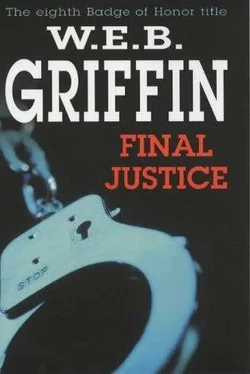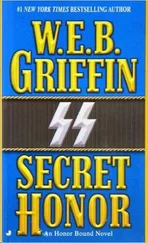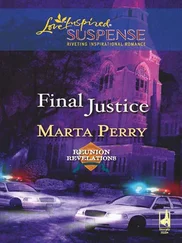W. Griffin - Final Justice
Здесь есть возможность читать онлайн «W. Griffin - Final Justice» весь текст электронной книги совершенно бесплатно (целиком полную версию без сокращений). В некоторых случаях можно слушать аудио, скачать через торрент в формате fb2 и присутствует краткое содержание. Жанр: Полицейский детектив, на английском языке. Описание произведения, (предисловие) а так же отзывы посетителей доступны на портале библиотеки ЛибКат.
- Название:Final Justice
- Автор:
- Жанр:
- Год:неизвестен
- ISBN:нет данных
- Рейтинг книги:3 / 5. Голосов: 1
-
Избранное:Добавить в избранное
- Отзывы:
-
Ваша оценка:
- 60
- 1
- 2
- 3
- 4
- 5
Final Justice: краткое содержание, описание и аннотация
Предлагаем к чтению аннотацию, описание, краткое содержание или предисловие (зависит от того, что написал сам автор книги «Final Justice»). Если вы не нашли необходимую информацию о книге — напишите в комментариях, мы постараемся отыскать её.
Final Justice — читать онлайн бесплатно полную книгу (весь текст) целиком
Ниже представлен текст книги, разбитый по страницам. Система сохранения места последней прочитанной страницы, позволяет с удобством читать онлайн бесплатно книгу «Final Justice», без необходимости каждый раз заново искать на чём Вы остановились. Поставьте закладку, и сможете в любой момент перейти на страницу, на которой закончили чтение.
Интервал:
Закладка:
The procedure went back many years, to when Captain Denny Coughlin had been given command of the Homicide Bureau and Homicide detective Frank Hollaran had become- without either of them planning it-Coughlin’s right-hand man.
As Coughlin had risen through the hierarchy, Hollaran had risen with him, with time out for service as a uniform sergeant in the Fifth District, as a lieutenant with Northeast Detectives, and as district commander of the Ninth District.
Last night, when Hollaran had called Coughlin, Coughlin had said, “You better pick me up, Frank. It’s going to be a long night.”
It had turned out to be a long night. The commissioner himself, Ralph J. Mariani, had shown up at the Roy Rogers minutes after Coughlin and Hollaran. He had immediately put Hollaran to work organizing the notification party. The mayor, who was out of town, was not available, so Mariani would be the bearer of the bad news.
When finally the party was assembled, it consisted of Mariani, Coughlin, the police department chaplain, the pastor of the Methodist Episcopal Church attended by the Charlton family, the First District captain, and Officer Charlton’s lieutenant and sergeant.
Captain Leif Schmidt, the First District commander, telephoned Mrs. Charlton and told her that he had had a report her husband had been injured and taken to Methodist Hospital, and that he had dispatched a car to pick her up and take her there.
Sergeant Stanley Davis, Officer Charlton’s sergeant, accompanied by police officer Marianna Calley, went to the Charlton home and suggested to Mrs. Charlton that it might be a good idea if Officer Calley, who knew the kids, stayed with them while she went to the hospital.
The notification protocol had evolved through painful experience over the years. It was better to tell the wife at the hospital that she was now a widow, rather than at her home. There were several reasons, high among them being that it kept the goddamn ghouls from the TV stations from shoving a camera in the widow’s face to demand to know how she felt about her husband getting killed.
It also allowed the notification party to form at the hospital before the widow got there. The mayor would normally be there, and the police commissioner, and other senior white shirts, and it was better for them to hurry to a known location than descend one at a time at the officer’s home, which sometimes might not have space for them all, and would almost certainly be surrounded by the goddamn ghouls of the Fourth Estate, all of whom had police scanner radios, and would know where to go.
Telling the widow at the hospital hadn’t made the notification any easier, but it was the best way anyone could think of to do it.
The third document on Deputy Commissioner Coughlin’s desk, which had been delivered to his office shortly before five the previous afternoon-just after Coughlin had left for the day-was in a sealed eight-by-ten manila envelope, bearing the return address “Deputy Commissioner (Personnel) ” and addressed “Personal Attention Comm. Coughlin ONLY.”
Coughlin tried and failed to get his fingernail under the flap, and finally took a small penknife from his desk drawer and slit it open.
It contained a quarter-inch-thick sheaf of stapled-together paper. Coughlin glanced at the first page quickly and then handed it to Hollaran.
“I think this is what they call a dichotomy,” Coughlin said. “The good news is also the bad news.”
Hollaran took the sheaf of xerox paper and looked at the first three pages. It was unofficially but universally known as “The List.”
It listed the results of the most recent examination for promotion to sergeant. Two thousand seven hundred and eighty-two police officers-corporals, detectives, and patrolmen with at least two years’ service-had taken the examination. Passing the examination and actually getting promoted meant a fourteen percent boost in basic pay for patrolmen, and a four percent boost for corporals and detectives.
A substantial percentage of detectives earned so much in overtime pay that taking the examination, passing it, and then actually getting promoted to sergeant-who put in far less overtime-would severely reduce their take-home pay. Many detectives took the sergeant’s examination only relatively late in their careers, as a necessary step to promotion to lieutenant and captain, because retirement pay is based on rank.
The examination had two parts, written and oral. Originally, there had been only a written examination, but there had been protests that the written examination was “culturally biased” and an equally important oral examination had been added to the selection process.
Passing the written portion of the examination was a prerequisite to taking the oral portion of the examination, and a little more than five hundred examinees had failed to pass the written and been eliminated from consideration.
Oral examinations had begun a month after the results of the written were published, and had stretched out over four months.
Six hundred eighty-four patrolmen, corporals, and detectives had passed the oral portion of the sergeant’s examination and were certified to be eligible for promotion.
That was not at all the same thing as saying that all those who were eligible for promotion would be promoted. Only fifty-seven of the men on The List-less than ten percent-would be “immediately”-within a week or a month-promoted. A number of factors, but primarily the city budget, determined how many eligibles would be promoted and when. The eligibles who weren’t promoted “immediately” would have to wait until vacancies occurred-for example, when a sergeant was retired or promoted.
What that translated to mean was that if an individual ranked in the top 100, or maybe 125, on The List, he or she stood a good chance of getting promoted. Anyone ranking below 125 would almost certainly have to forget being promoted until The List “expired”-usually after two years- and a new sergeant’s examination was announced and held.
The first name on The List in Hollaran’s hand-the examinee who had scored highest-was Payne, Matthew M., Payroll No. 231047, Special Operations.
“Why am I not surprised?” Hollaran asked, smiling, and then added, unctuously, “Detective Payne is a splendid young officer, of whom the department generally, and his godfather specifically, can be justifiably proud.”
“Go to hell, Frank,” Detective Payne’s godfather said, and then added, “What he needs is a couple of years-more than a couple: three, four years-in uniform, in a district.”
“You really didn’t think Matt would ask for a district assignment? In uniform?” Hollaran asked, chuckling.
When Police Commissioner Mariani had announced the latest examination for promotion to sergeant, he had added a new twist, which, on the advice of other senior police officials and personnel experts, he believed would be good for morale. The five top-ranking examinees would be permitted to submit their first three choices of post-promotion assignment, one of which would be guaranteed.
Deputy Commissioner Coughlin had at first thought it wasn’t a bad idea. And then he had realized it was almost certainly going to apply to Matthew M. Payne, and that changed things. Matty’s scoring first-which meant that there would be no excuse not to give him the assignment he had chosen- made it even worse.
“I had lunch with him last Thursday,” Coughlin said. “I told him, all things considered, that he stood a pretty good chance of placing high enough on The List…”
“How prescient of you, Commissioner,” Hollaran said, smiling.
“How do you think you’re going to like the last-out shift in Night Command, Captain?”
The last-out-midnight to eight A.M.-shift in Night Command was universally regarded as the department’s version of purgatory for captains. Those who occupied the position usually had seriously annoyed the senior brass in one way or another. There was no relief from the midnight-to-morning hours; the occupant was required to be in uniform at all times while on duty, and he was the only captain in the department to whom the department did not issue an unmarked car.
Читать дальшеИнтервал:
Закладка:
Похожие книги на «Final Justice»
Представляем Вашему вниманию похожие книги на «Final Justice» списком для выбора. Мы отобрали схожую по названию и смыслу литературу в надежде предоставить читателям больше вариантов отыскать новые, интересные, ещё непрочитанные произведения.
Обсуждение, отзывы о книге «Final Justice» и просто собственные мнения читателей. Оставьте ваши комментарии, напишите, что Вы думаете о произведении, его смысле или главных героях. Укажите что конкретно понравилось, а что нет, и почему Вы так считаете.











